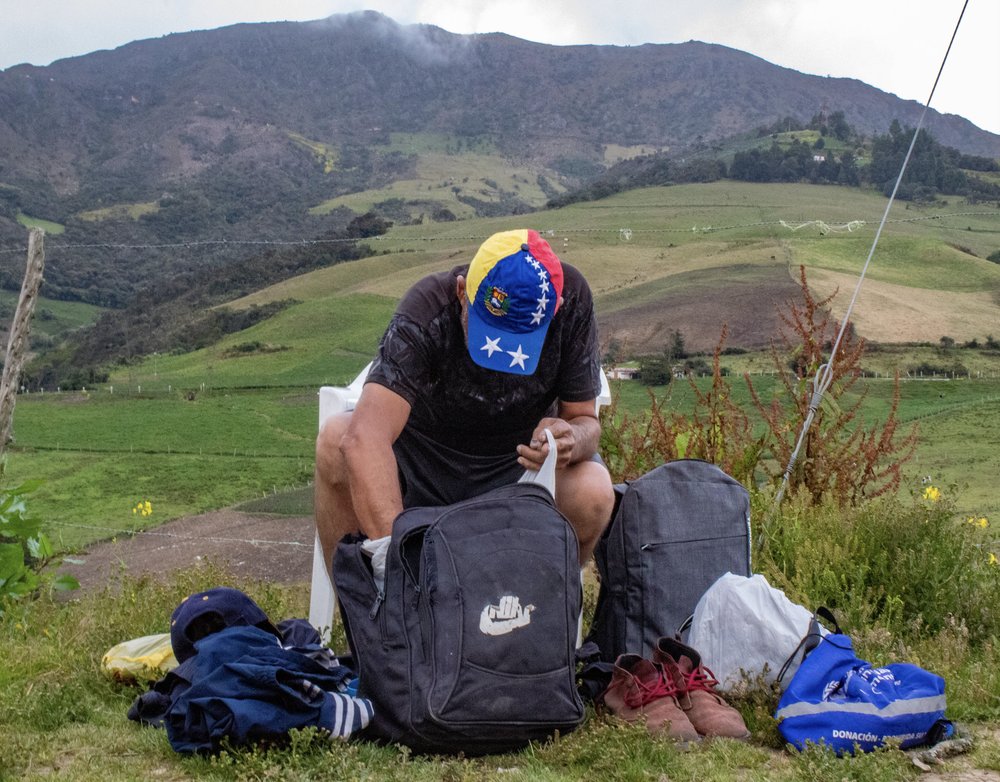The Packing List of Venezuelan Displacement
Royal blue drawstring bags carve marks into backs, leaving imprints and a sore throbbing that lingers long after the day’s walk. On nights when the earth becomes a mattress, the bag turns into a pillow— a comfort and reminder of the weight that caminantes, walking Venezuelan migrants, carry. Once the aid supplies are used up, the previously sterile backpack fills with smells and the weight of a life left behind, accompanying its owner through limbo toward an uncertain future.
In the wake of Venezuela’s economic collapse, political turmoil, and social unrest, approximately 25% of the population has fled since 2014, according to Human Rights Watch. This exodus has resulted in one of the largest displacement crises globally. Due to hyperinflation, many migrants are left with nothing, carrying their lives in makeshift backpacks and traveling by foot. The August election results, which declared authoritarian leader Nicolás Maduro president for another six years, have been widely disputed by both the Venezuelan opposition and numerous international governments, who reject the legitimacy of the voting process. This has further deepened the sense of insecurity and fear of continued instability amongst Venezuelans, potentially accelerating the already massive outflow of people.
As vehicles zip by along the roads traveled by caminantes crossing into new lands, the blue bags—handed out at aid points—blur into the landscape. For five weeks, I lived along the 17-mile caminante route from Cúcuta, a Colombian border city, to Bucaramanga, the capital of Santander. There, I interviewed caminantes both leaving and returning to Venezuela amid the controversy and uncertainty of the election.
During this tense period, I asked migrants to open their backpacks and unzip their stories. What follows are glimpses of their journeys—reflecting what they carry, what they left behind, and the paths they’ve taken toward an unsettled future.
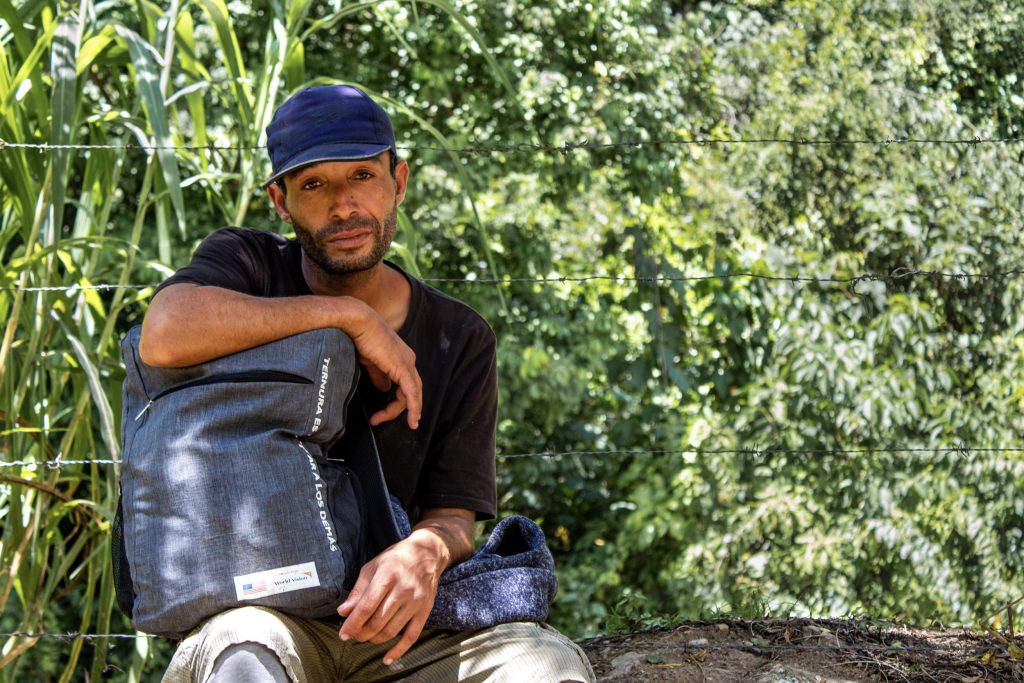
Fernando José Leota:
From Working the Border to Crossing it.
ESPERANZA HOY SHELTER–26 miles from the border (nine hours walking)
“What year is it?” Fernando José Leota pauses mid-bite, trying to calculate how long it’s been since he left his home
in Caracas, Venezuela.
Five years.
Now, he sits in a shelter along the route, eating lunch, dressed in tatters. Yet in another life in Venezuela, Leota once wore a pressed uniform, a gun at his hip. “That’s the only thing I knew how to do: take orders and follow orders,” he says, reflecting on his previous life as a soldier.
He once enjoyed a sense of security, a privilege he saw quickly slipping away from everyone in his country. But one day, his conscience finally rebelled. “I had missions at the border,” he explained, and was instructed to be prepared for any situation. “But I was never asked to shoot at Venezuelans.”
Until the day he was. “When I looked through the sight [of the rifle] and saw a friend on the other side, I couldn’t bring myself to pull the trigger,” he said, finally facing who his work along the border was targeting. “I handed over my rifle and left.”
Crossing over the very border he once surveilled, Leota left behind his few remaining family members and sought a new life. He gained moral clarity but relinquished the
security he once held.
In the five years since, Leota has traversed nine of the twelve countries in South America, traveling by foot, hitching rides on trucks, or using “whatever I get,” he says with a shrug. Now he’s on his way back to Brazil, heading for the Amazon. It is the only country that treats Venezuelans well, he explains.
Brazil is familiar ground for Leota, a place he once called home with his partner and son. He worked as a mechanic, trying to build a future. But when his relationship fell apart, he left. Now he is returning to Brazil, but with no plans to reconnect with his ex-partner or son.
With him, he carries only a bedsheet and a hammock. “I recently threw [my big bag] away,” he says. After years of walking, the weight on his shoulders made the choice for him.
“How do I feel?” he asks, his voice softening. “It’s like losing
your family again.”
“The smell of my mom; the smell of my son,” he reminisces. Each morning, Leota wakes up and faces the day with a smile. But when the day ends, he is left alone in a space once filled by family. “Without family, nothing is worth it.”
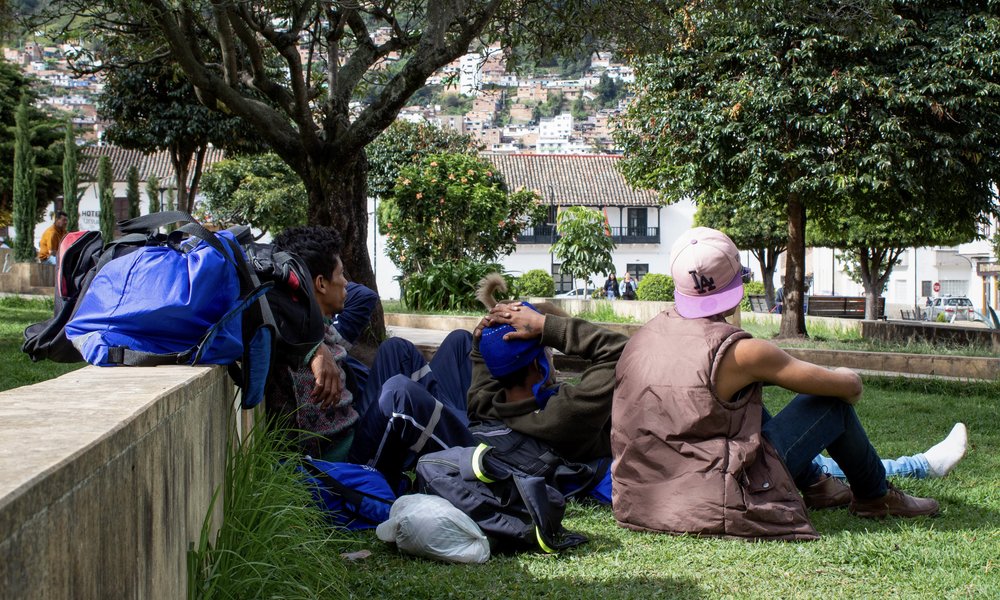
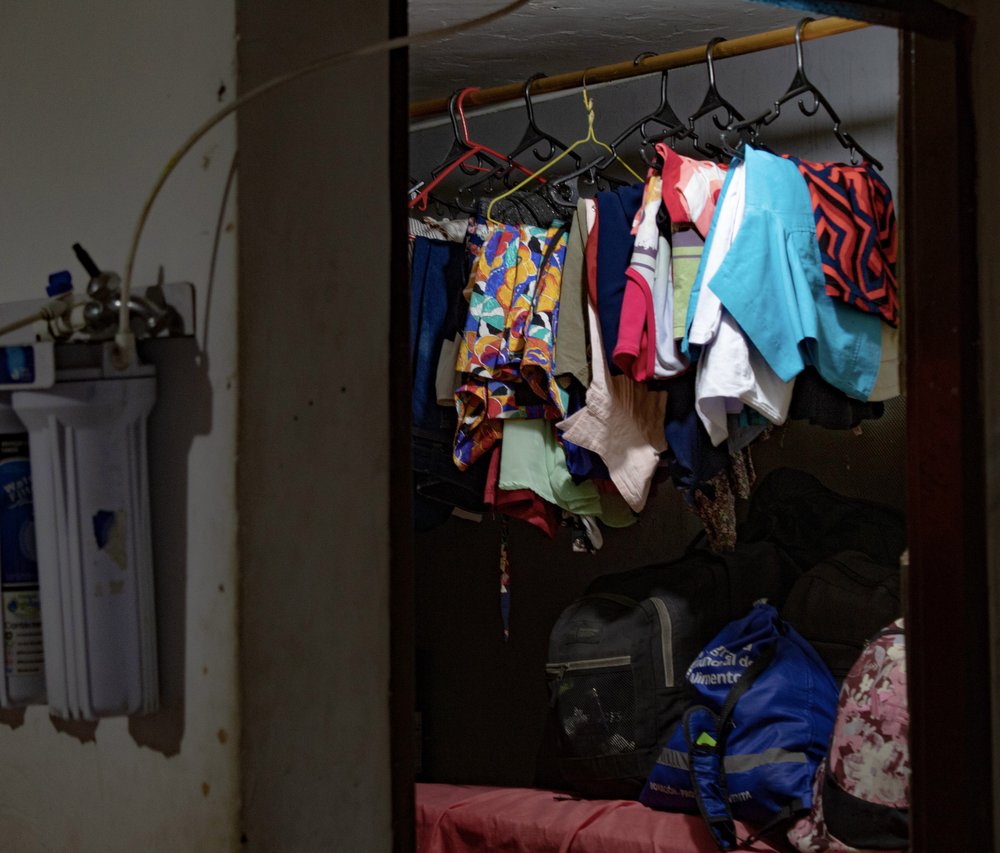
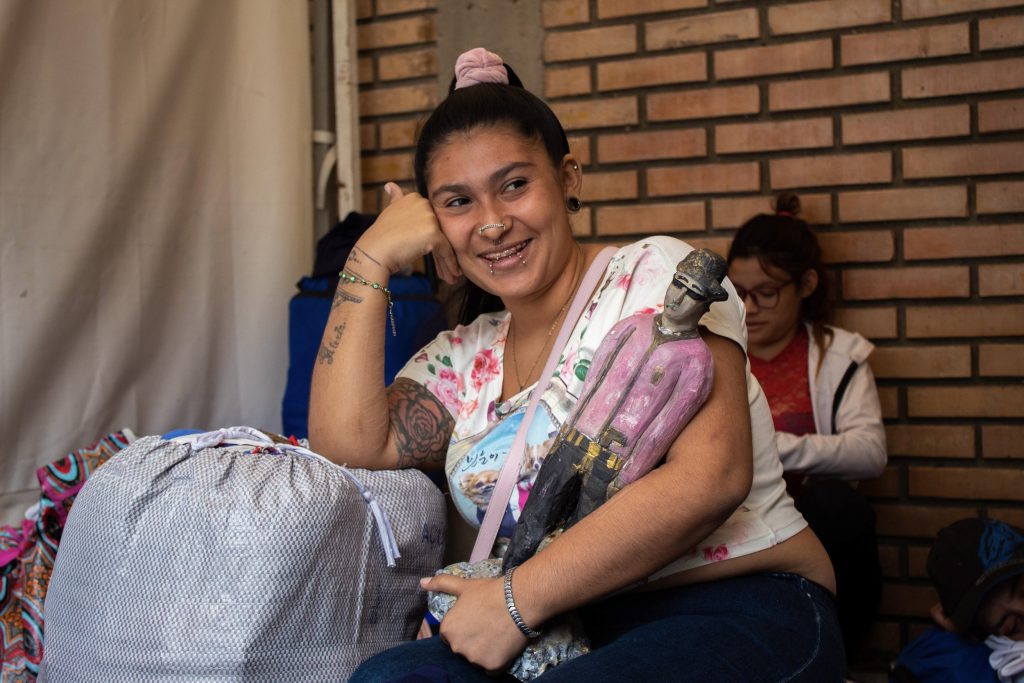
Nohelia Juaréz:
Guardian of a Saint.
MARTA DUQUE FOUNDATION—44 miles from the border (15 hours walking)
Propped up on one of the many sacks sits the queen. Adorned with a dazzling array of shine and sparkle on her nose, earlobes and lips, she exudes a regal aura. Yet, it is what she cradles in her ink-embellished arms that captivates the eye: a saint sporting sunglasses and smoking a spliff.
Nohelia Juaréz carries with her Malandro Ismael, the criminal saint of Venezuela, for protection on her journey. Revered as a Robin Hood figure, Malandro Ismael is buried in Caracas; his grave attracts many seeking his protection, with some carrying statues of him for safe passage.
Juaréz laughs as she describes her criminal clay child in hand. “He doesn’t weigh too much,” she says, planning to keep him safe under her arm during the over 1,000-mile trek to Ecuador, trusting that he will protect her and her group in return.
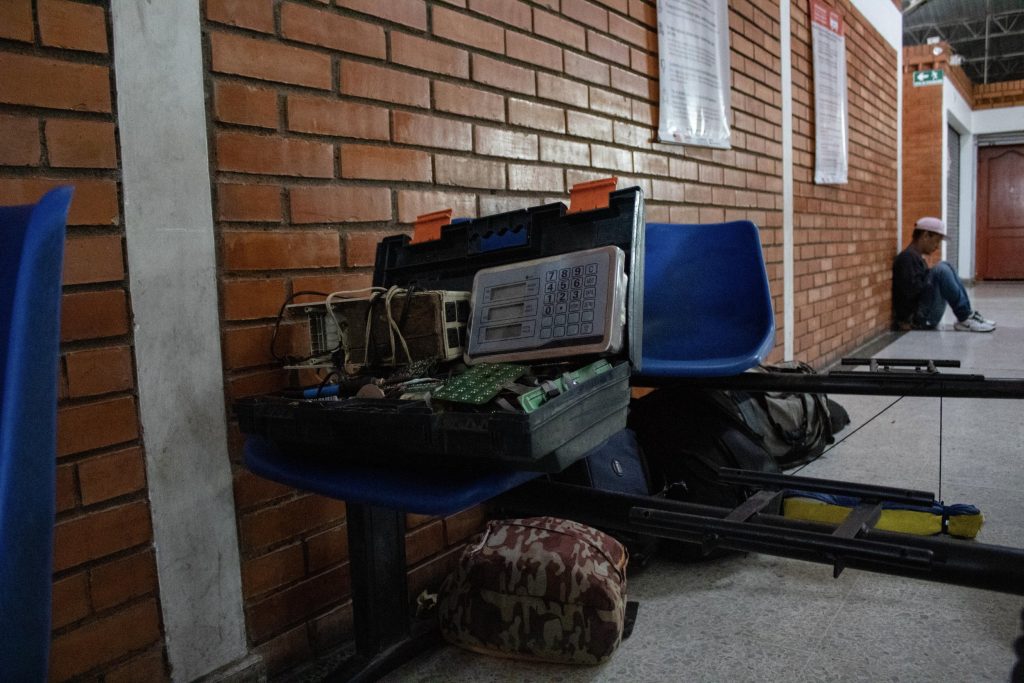
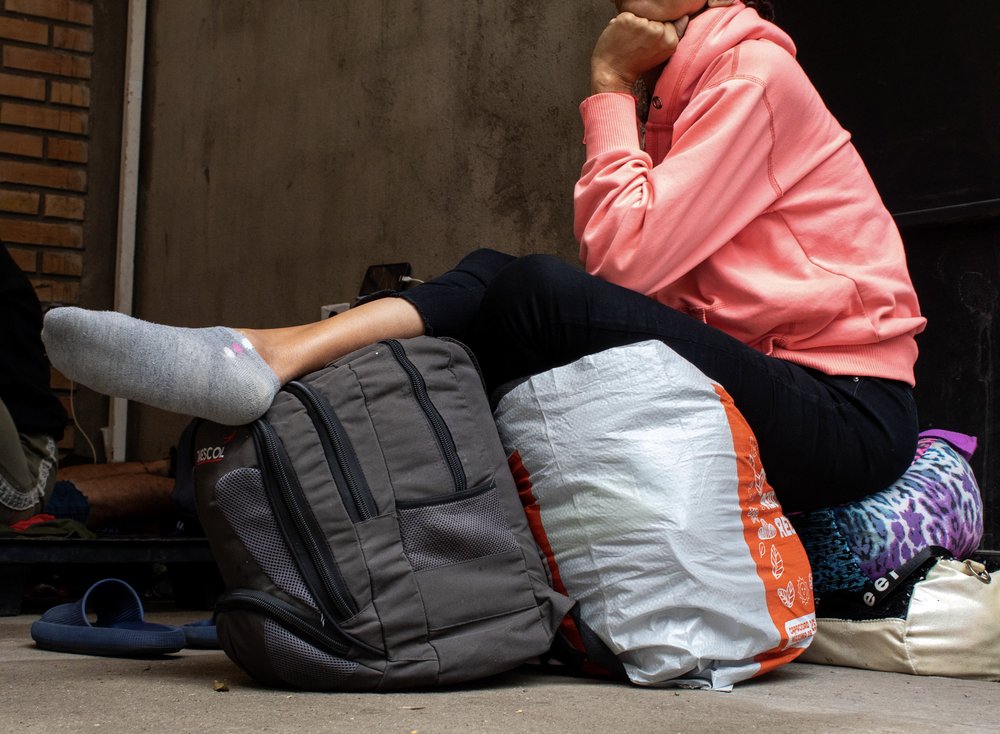
caminantes’ bags double as pillows and cushions.
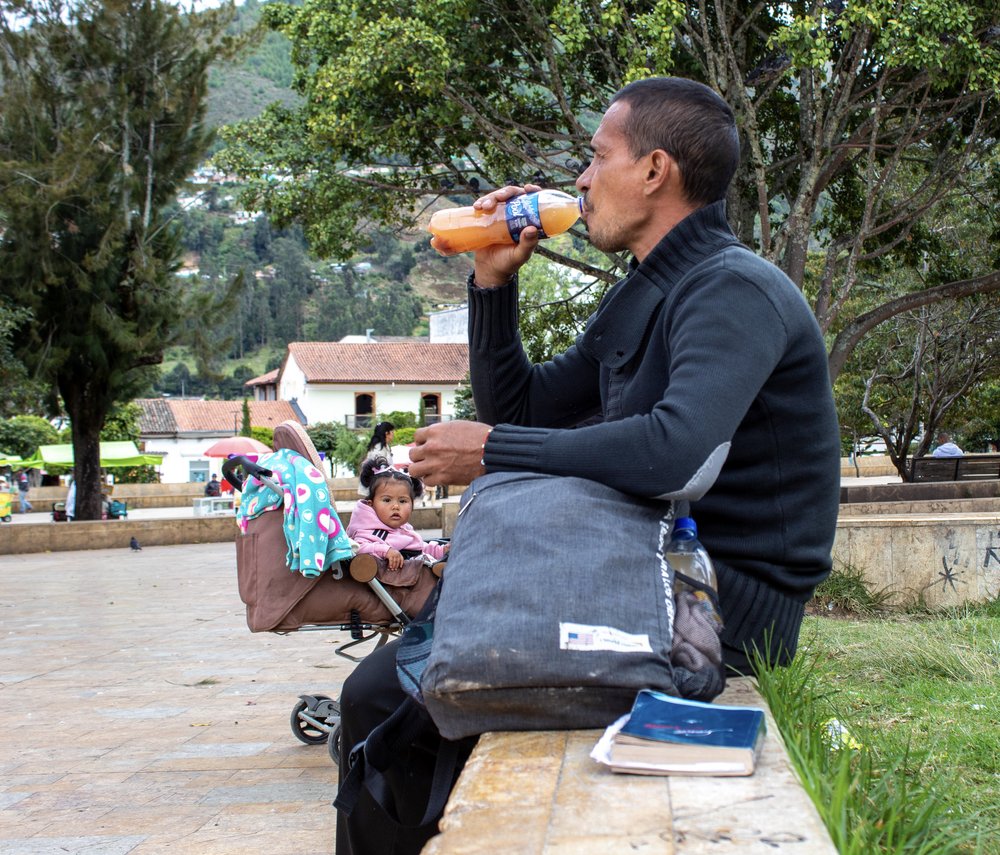
caminantes’ bags double as pillows and cushions.
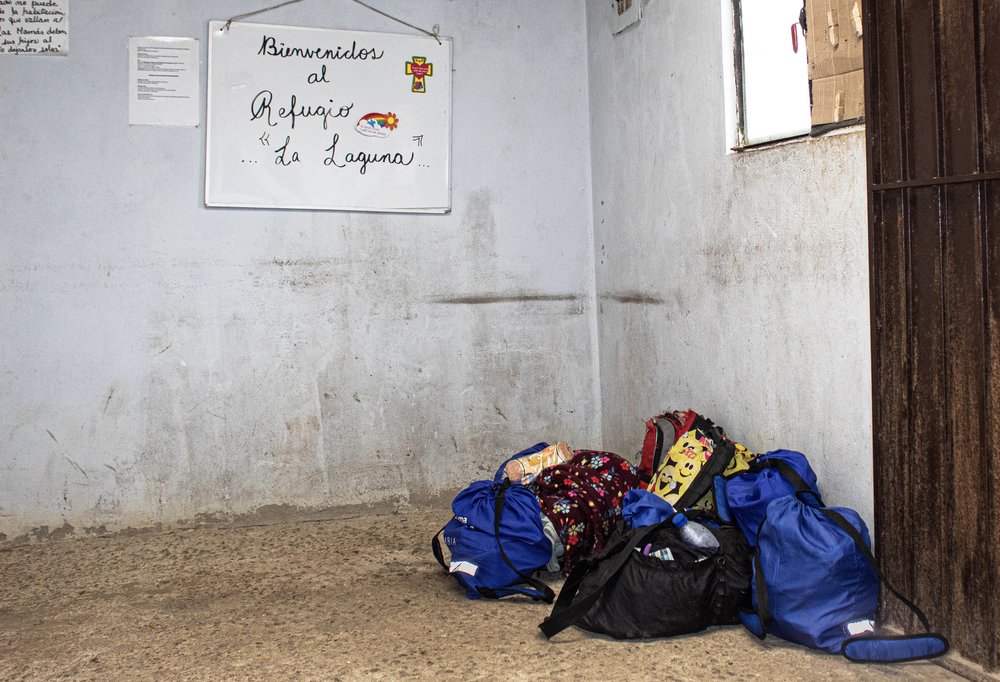
Royal blue drawstring bags carve marks into backs, leaving imprints and a sore throbbing that lingers long after the day’s walk. On nights when the earth becomes a mattress, the bag turns into a pillow— a comfort and reminder of the weight that caminantes, walking Venezuelan migrants, carry.
Wilmer Said:
Tools for Survival.
PAMPLONA BUS TERMINAL—44 miles from the border (15 hours walking)
Feet rise and backpacks mount on shoulders as the aid organization calls out numbers. For Wilmer Said, his number has passed, and his belongings are lying next to him on the blue plastic seat. While he hoped to leave the station today, the next bus won’t be waiting for him, or the one after that. The following leg of his journey now depends on the objects he carries with him.
Said, previously an electronics major at the National Open University in Venezuela, now depends on the skills of his studies to keep him moving forward along the route. He gestures to a big rectangular case at his side. Inside glitter chips, wire and tools. From his backpack he pulls more buttons and gadgets. The space usually devoted to essentials like toiletries has been replaced by tools.
“If there’s a spare part that someone doesn’t have, I have it instantly,” he explains, a traveling repairman of sorts.
Said hoped to receive a free bus ticket from ZOA International, an aid organization with an office in the terminal, but didn’t meet the requirements. The fare costs the equivalent of $12 USD. He currently has $1.50 in his pocket.
As a previous student of higher education, Said’s life on the streets continues to be an adjustment. “I had never experienced [life] like this, nor did I ever think I would,” he said.
He now sits halted in the bus station until his tools earn him enough to continue the journey.
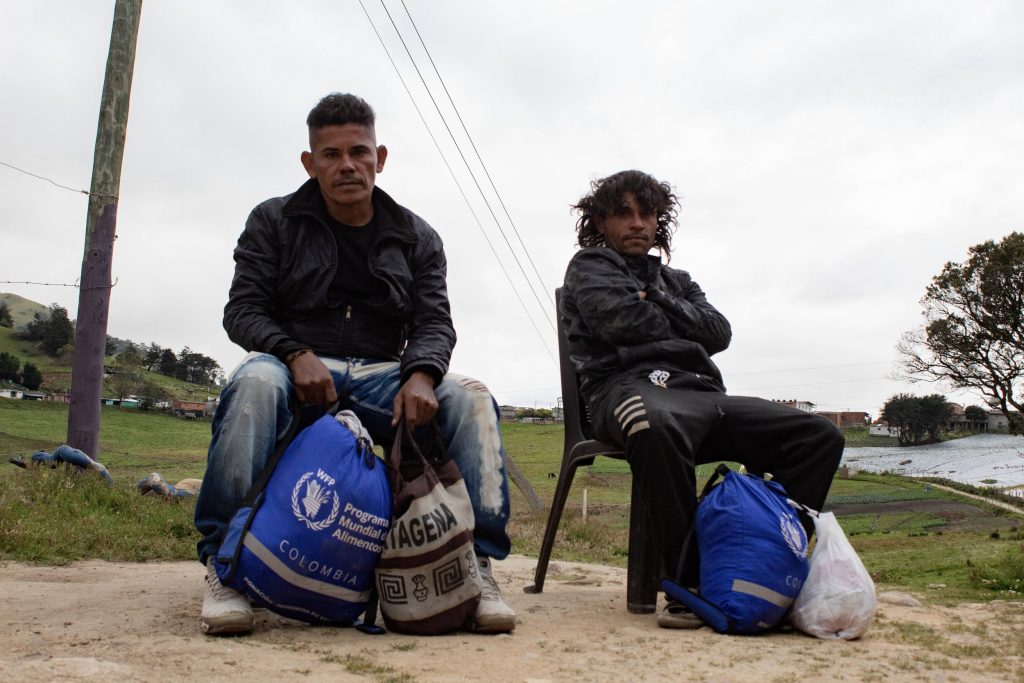
William Gomez and Dani Balaguera Soler:
Strangers to Allies.
LA LAGUNA SHELTER—65 miles from the border (22.5 hours walking)
If it weren’t for his friend, Dani Balaguera Soler would be making the rest of his journey barefoot. “Friend” might be a stretch. The two men met just the night before at a shelter along the route. Yet now, Soler’s toes peek out from his new travel companion’s cow slippers.
He and his friend, William Gomez, realized they were both headed to Medellín, having heard about work opportunities in coffee harvesting, and decided to stick together the rest of the way.
Soler’s pants are barely held together by thread at the crotch, and his jacket flakes off like dry skin after too much sun. The items that cling to him are the only ones that survived a nap the day before. Tired from hours of walking, Soler decided to rest his eyes on the side of the road. When he awoke, his bags were gone. “It’s just material,” he shrugged, wearing his nonchalant attitude better than his tattered clothes. “Material things
can be recovered.”
From Gomez’s jacket peeks a bracelet of the Virgin of Carmen. “I always carry it everywhere,” he explains, as protection.
“I have one too,” says Soler, reaching into his pocket. His hands pat down each spot on his body before he realizes that’s gone too.
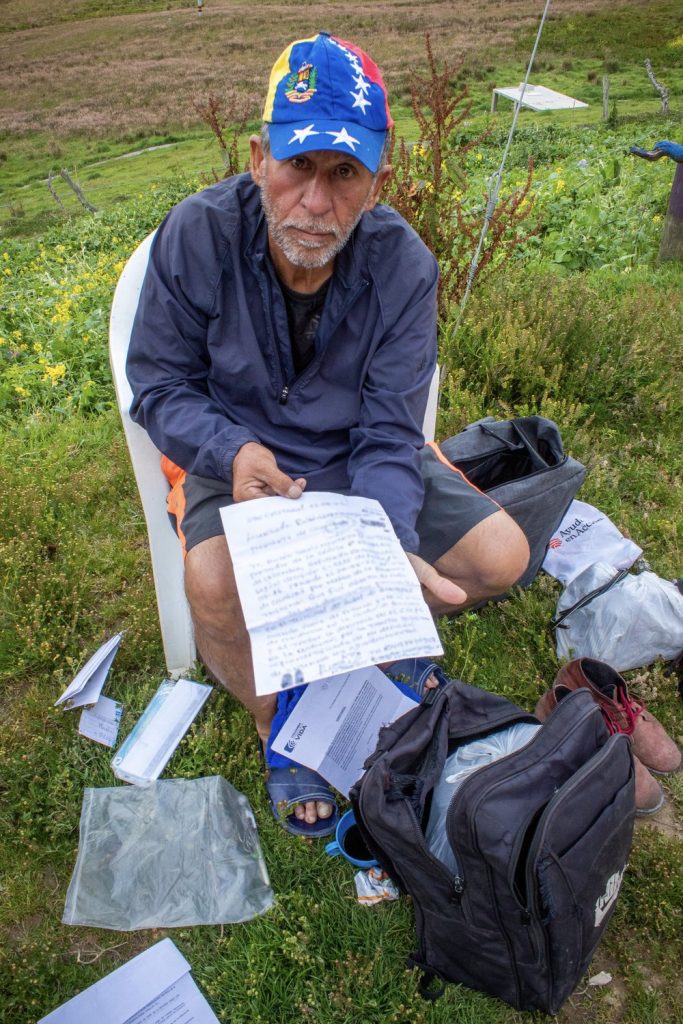
his toiletries.
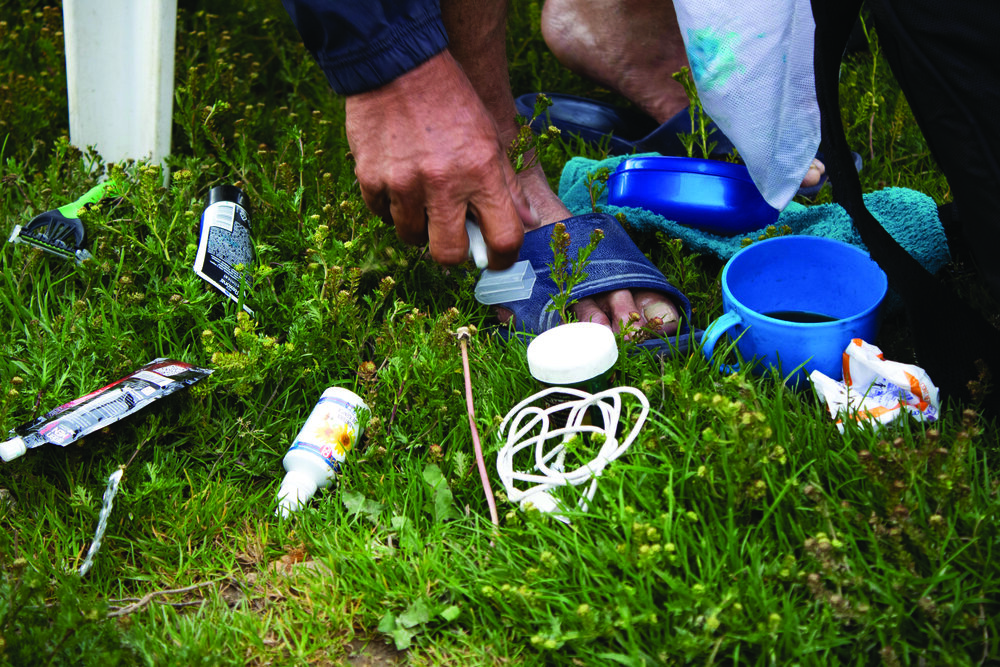
his toiletries.
While Montoya lives a humble yet comfortable life in Venezuela, the experience walking back causes him to reflect on Venezuela’s displacement crisis from a new and gritty perspective, making him think deeply about what many Venezuelans are enduring.
Rubén Darío Montoya:
Returning Refugee’s Twist of Fate.
LA LAGUNA SHELTER—65 miles from the border (22.5 hours walking)
The grass is littered with items that don’t belong there. Toothbrush, splaying wire to ward off dogs, essential refugee documentation. Rubén Darío Montoya isn’t sure he belongs here either.
Montoya, 68, who was granted asylum in Venezuela 32 years ago, is returning to his home country of Colombia to claim recompensation for what was taken from him. His wife and children–killed by The Revolutionary Armed Forces of Colombia, a Marxist–Leninist guerrilla group–he will never get back. But he continues to fight for the land they stole.
Traveling between his current home of Venezuela and Colombia, Montoya returned for the final decision on the case. “It is up to me to make all the expenses,” he said, explaining that he travels by bus between the two countries.
Yet on his way home after pleading his case, Montoya found himself face-to-face with some Venezuelan caminantes in a bus station in Medellín, metal pressed against his throat. And in a blink, he became a caminante himself.
“I was left without communication and without money,” he said.
His shaky hands smear salve on the soles of aching feet. Montoya’s worn-out suede shoes were not intended to carry him home by foot. He sets down the cream and reveals his pride and joy to one of the shelter worker’s sons. Pristine black Nike sneakers. “Look at the soles,” he says, requesting confirmation from the kid. “They’re real.” He places the shoes in the plastic bag at the bottom of his backpack and slips back on his faded, flat-footed pair.
While Montoya lives a humble yet comfortable life in Venezuela, the experience walking back causes him to reflect on Venezuela’s displacement crisis from a new and gritty perspective, making him think deeply about what many Venezuelans are enduring.
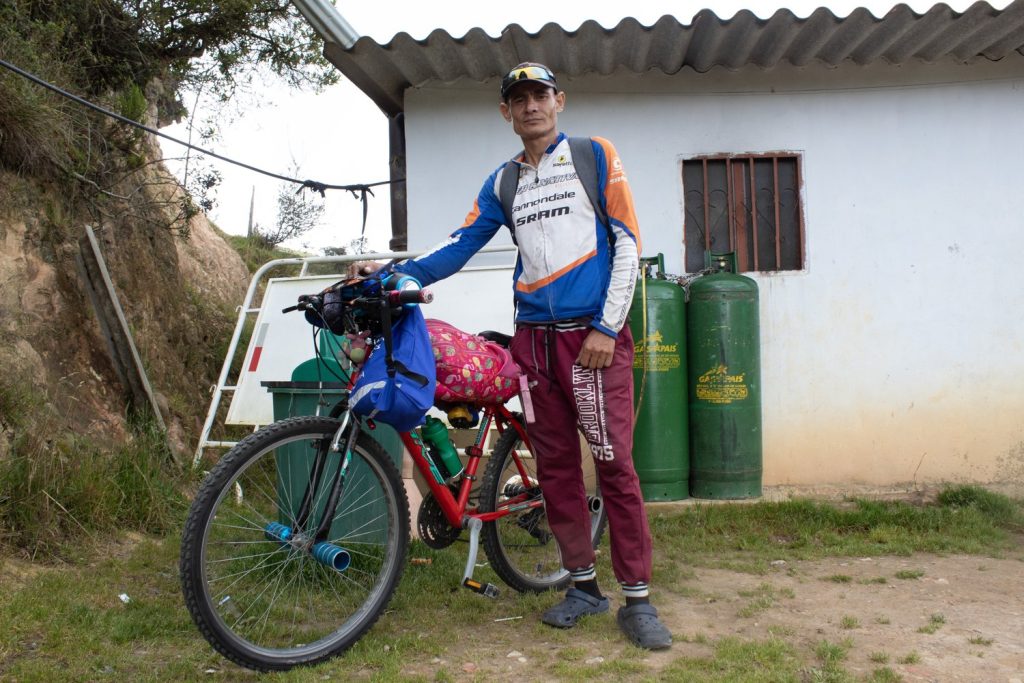
“It’s exhausting,” he added. “It is an experience I do not want to live through again.”
“When I was young … I never imagined that I was going to leave my country,” he said. Yet as job opportunities dwindled, his decision to travel was driven not by tourism but by necessity.
John Rozo Ayala:
Pedaling Home.
LA LAGUNA SHELTER—65 miles from the border (22.5 hours walking)
While cross-country bike trips are often done for sport, John Rozo Ayala is not cycling for the views.
Ayala left Venezuela in 2019 and found work at a recycling plant in Medellín. “When I was young … I never imagined that I was going to leave my country,” he said. Yet as job opportunities dwindled, his decision to travel was driven not by tourism but by necessity.
“This is my faithful companion,” he said, pointing to his upcycled bicycle. The journey from Medellín back to his hometown in Venezuela is a grueling test of endurance. Though the views are beautiful, the trip is fraught with risks. Ayala navigates treacherous, winding roads where he competes with trucks that swerve unpredictably. It’s a battle he knows he can easily lose.
As Ayala’s eyes strain to meet the rapidly darkening road, his pedals slow. Finding aid points each night is unpredictable, and while a mattress might be a daily uncertainty, he always has his makeshift bed. On shelterless nights, he ties his bags to the bike and sleeps by the roadside. “My bed on the road is
the bicycle,” he said.
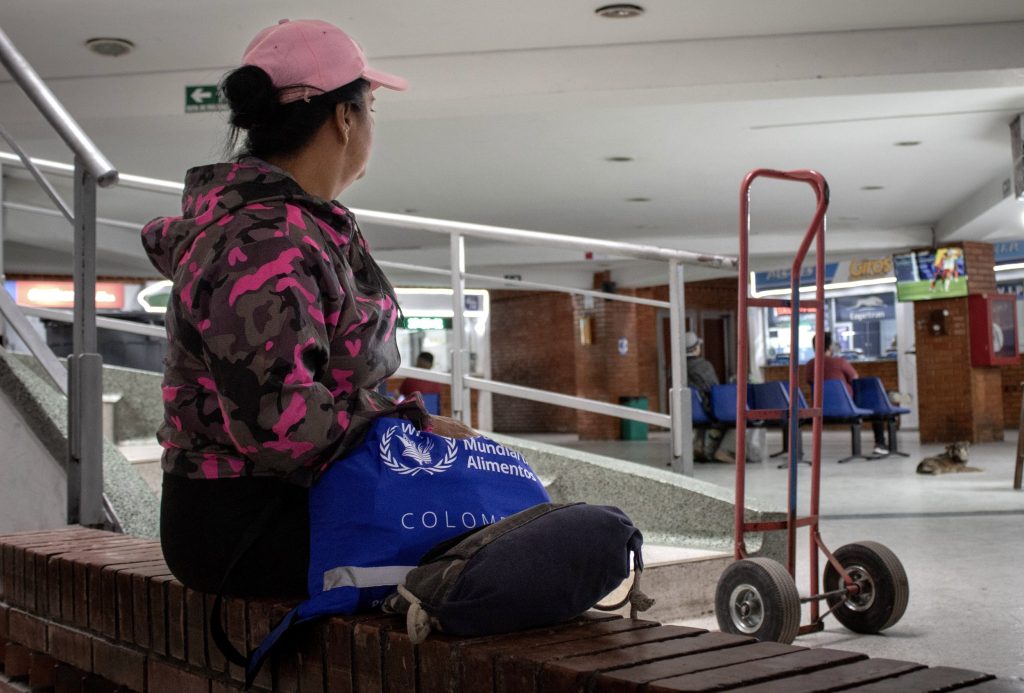
María Guerrero:
The In-Between
PAMPLONA BUS TERMINAL—44 miles from the
border (15 hours walking)
Sitting on a ledge near the stairs, María Guerrero tries to blend into the sleepy ambiance of the bus station on a Wednesday afternoon. Yet her blue bag marks her immediately. She has no plans or funds for a ticket—she simply rests while observing others come and go.
Although returning to Venezuela, Guerrero left most of
her belongings in Bogotá, which she now holds as her
stand-in for ‘home.’
During her last trip back, the National Guard confiscated her phone at the border. This time, she doesn’t want to carry
anything valuable they might take. She travels with just clothing and some candy to sell, which now serves as her only
source of income.
After losing her job in Bogotá, the 56-year-old woman took it as a sign to make the 25-day journey back to Venezuela on foot to visit her sister, who has colon cancer.
The homecoming is brutal—both physically and emotionally. “Right now in Venezuela, there is nothing. No medicine,
nothing,” she says, unsure whether this visit with her sister will be her last.
She appears to be traveling alone, which is dangerous. She says she’s making the journey with a group, that she’s not alone, that she’s just not sure where everyone went at this moment.
Five days she’ll stay. And then another 25 days to return to a place that no longer holds stability either.
With her sister in one country and her belongings in another, Guerrero feels trapped between the two, navigating a painful limbo until something larger than herself changes her fate. “One learns from life. Life teaches us,” she says. “And in the end, God has the will.”
These snapshots each capture a distinct moment along the route. For some, this documents their first crossing, for others the third, fourth, fifth. A keen eye might guess which it is by the belongings they carry. Those just starting out carry statues, toolboxes, multiple pairs of shoes; the veterans leave it all behind. Regardless of what’s brought on their backs, the stories they carry consistently lead back to home, to what was left behind and what they hope to someday return to.
Orliannis, 18, who chose not to include her last name, sits alone in a shelter room of sagging mattresses. One hand strokes the pet turtle her mother gave her, while the other rests on her growing belly. Will she one day reunite her child and turtle with their grandmother? “Without a doubt,” she says, having just left but already dreaming of her return. “It’s the hope
of all Venezuelans.”
Cover Photo: A caminante unpacking his belongings.
Text and photography by Shandra Back
Shandra Back is a fourth-year undergraduate student in the College of Communications and Kilachand Honors College at Boston University. She is majoring in Journalism with a minor in Political Science. Her work in migration and forced displacement has taken her to parts of the Middle East, Latin America, and the U.S.–Mexico border. Her travel podcast, Sunshine on a Dime, is a nominee for the 2022 Best College Podcast with the Intercollegiate Broadcasting Society. She works as the Podcast Director at the CFD center.
